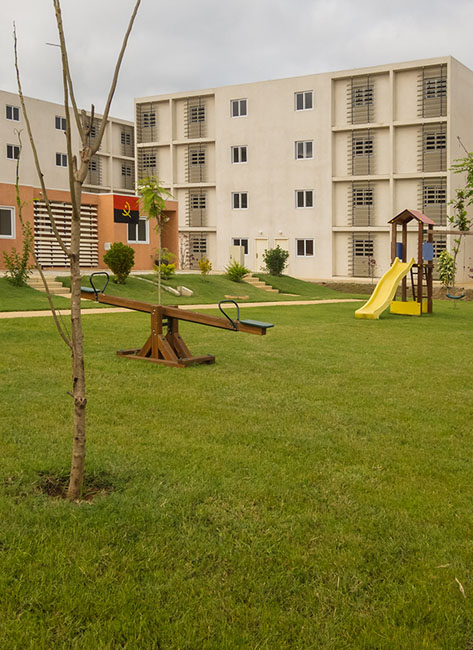Cidade Horizonte do Uíge, Uíge (AO)
Jaime Lerner
Samenvatting
Angola was van 1961 tot 2002 in oorlogen verwikkeld, te beginnen met de Angolese onafhankelijkheidsoorlog van 1961 tot 1974. Nadat de koloniale overheersing door de Portugezen was beëindigd, brak in1975 een burgeroorlog uit die tot 2002 duurde. In beide gevallen speelden de conflicten zich vooral op het platteland af, wat de ontwikkeling van een fatsoenlijke sociale en fysieke infrastructuur doorkruiste. In combinatie met het wijdverspreide gebrek aan mogelijkheden om inkomsten te verwerven, leidde dit tot een gestage, vastbesloten – en tot op heden voortdurende – migratie van miljoenen mensen van het platteland naar de belangrijkste steden. Het woningtekort in de grote steden neemt nog steeds toe; officiële schattingen spreken zelfs van een huisvestingsachterstand van bijna 2 miljoen eenheden.
Als gevolg van de economische impuls van de olieopbrengsten in de periode na de burgeroorlog stimuleerde de overheid de ontwikkeling van nieuw huisvestingsbeleid, met het voornemen de achterstanden in te lopen. Tijdens de verkiezingscampagnes van 2008 begon de politieke belangstelling voor de huisvestingskwestie in het oog te springen. José Eduardo dos Santos, sinds jaren president van Angola, beloofde zelfs dat in de vijf daaropvolgende jaren (tussen 2008 en 2012) 1 miljoen huizen zouden worden gebouwd. Halverwege deze periode, in 2010, werd het nationale woningbouwprogramma omgedoopt tot Meu Sonho Minha Casa (Mijn droom, mijn huis). De overheid benoemde vier belangrijke partijen en ontwikkelaars om stadsvernieuwingsoperaties in bestaande informele nederzettingen en de bouw van nieuwe woonwijken in het hele land te stimuleren. De overheid suggereerde zelfs dat de publieke sector 11,5 procent van de benodigde woningen zou leveren, publiek-private partnerships 12 procent zouden ontwikkelen, de coöperaties 8 procent voor hun rekening zouden nemen en de resterende woningen zouden worden gerealiseerd via geassisteerde zelfhulpinitiatieven.



